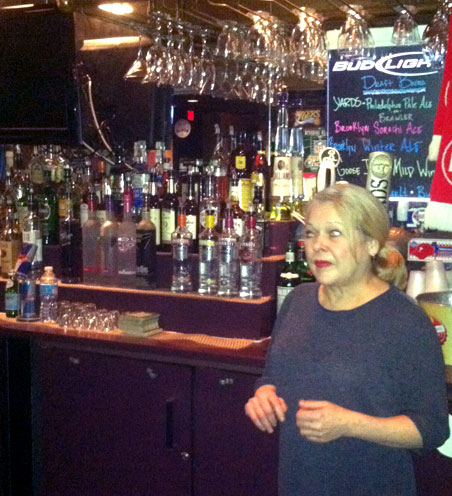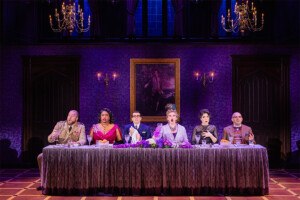Destined for Demolition, the Best Western’s Bar Keeps Serving Drinks
For reasons that aren’t entirely clear, Brian Coyle fucking hates the Eagles.
It’s a Friday night in January and the ruddy-faced Navy vet is sitting at the B & W Sports Bar at the Best Western Center City, trying to explain to me why. About a decade ago, there was a reception at the Linc to thank the union guys who had built the place. A cousin of his did legal work for the Eagles, and landed him an invite.
“Jeff Lurie came in. And everybody got in line like it was the Queen of fucking England. Genuflecting, kissing the ring. And I’m getting steamed, brother.”
Iffy, a Pakistani cab driver, chimes in: “Jeff Lurie is a jerk.” Brian continues.
“That little prick. Gets to me. I stick my hand out, and Simon, I grabbed his hand. Put your hand out. [I put my hand out.] And I fucking squeezed the shit out of it, and I looked him right in the face. And he says, ‘What do you think of this facility?’ And I say, ‘Yeah. Us taxpayers really broke our back to give you this.’” Lurie shook his hand free, Coyle says, and stormed out of the room, leaving the rest of the line hanging. His cousin hasn’t spoken to him since.
But Brian Coyle’s story isn’t really about Jeff Lurie. It’s about the B & W.
“This bar,” he says, “was the one place I could just come in and just trash the fucking Eagles.”
When the Best Western gets publicity, it’s usually not good. In December, Sonic Youth’s Thurston Moore said a beloved guitar was stolen from his room there. A month earlier, plans to replace the Best Western with a Whole Foods were revealed. In a city that routinely protests the demolition of obscure, unbeloved buildings, no one piped up.
Indeed, one must ask, what is a dilapidated motel doing soaking up prime real estate in a neighborhood anchored by art museums and tony high-rises? Or, to turn the question on its head: In a city of a thousand bars, who the hell spends their Friday night drinking at the Best Western? And what will they lose when the place is no more? So, at least while it lasts, I spent a week there, trying to find out.
****
“Simon, this place goes way back,” Coyle says, sitting with Iffy in front of a box of half-eaten pizza. In the ’70s, when he and the neighborhood boys weren’t sneaking into Eastern State Penitentiary to smoke pot and throw rocks at cars, Coyle worked the hotel kitchen, making sandwiches. His sister ended up marrying a guy whose father was the general manager. Now, Coyle’s in the swimming pool business, and manages the one sitting in the parking lot, 40 yards away from us.
Visible from the rear of the Rodin Museum by its buzzing neon beer signs, the bar is T.G.I. Fridays lite, minus the customers. The polished feel—a relatively recent development—is meant to appeal in part to the gentrifying neighborhoods north of the hotel. According to Iffy, though, the Brooklyn Sorachi Ace Saison I’m drinking is one big reason the bar’s former black working-class base stopped coming. Now, the bar mostly gets busy when the pool leagues set up shop, or Japanese tourists file in to drink Budweiser.
But it wasn’t always so, Coyle tells me, reminiscing about the bad old days. Built in 1959, the hotel used to be called the Franklin Motor Inn. New York boxing promoters used to put up their guys here. Hookers idled, businessmen prowled, and the bar used to stay open till 4 a.m.
There was an A-list presence too. The last time Martin Luther King ever visited Philly, according to a 1994 piece in the Philadelphia Tribune, he spent the day sick in bed at the Franklin Motor Inn, his favorite hotel in the city. Joe Frazier, a regular, always sat in the same seat, on the far right end of the bar. (Marvis Frazier tells me his father ate breakfast at the hotel at least once a week for more than 30 years, but really came to “play the numbers.”) Neighborhood guy Bernard Hopkins still drinks at the bar, and no fewer than three people tell me about the time Cameron from Ferris Bueller’s Day Off recently showed up.
Despite the history, and the building’s classic mid-century design (fan-like arial floorplan, concrete stilts), Ben Leech of the Preservation Alliance for Greater Philadelphia says he can’t afford to lobby against its demolition: “There’s so little popular appreciation.”
Jerry Market, production manager at the Electric Factory, emails me: “I try not to send anyone to the Best Western. Only stories I would have would be horror stories from people who stayed in the dirty rooms or were accosted by hookers in the sports bar.”
And yet, it’s beloved by those who actually go. To a degree that makes you wonder if there’s more to it than anyone’s giving it credit for.
****
Sunday night, I meet Joanne, a petite, raspy-voiced bartender who’s too slow to run the place on Fridays and Saturdays. (Says Coyle a couple days before, with affection, “Any other restaurant or bar in the city, she’d be fired. Immediately.”) For the moment, the bar’s empty except for me, her, and bar/restaurant manager Brian Foder, who’s telling me what a huge crush Frazier had on Joanne.
“What a nice, down-to-earth guy,” says Joanne, demurring. A week before he died, “he came in here, and none of us knew that he was in the first stage of, I believe it was liver cancer. And actually, it was just to say goodbye to everyone, but he made like he was saying hello.”
It’s not just Joe Frazier. Mo, a thirtysomething Middle Easterner, followed her here from her old gig at the now-defunct Parkway Room. Michelle, a fortysomething divorcee who hasn’t yet changed from her gym clothes, won’t come in when Joanne’s not behind the bar. An unhinged-looking guy with long stringy hair eats alone and avoids eye contact with anyone else. “Customers,” she says. “They sort of just follow you.”
Others don’t really come to be with Joanne; they come for the sense of pride that comes with being one of her regulars. Around 8 p.m., a sweet, unassuming guy called Alex steps up to the bar. He’s on a date with his ex-girlfriend Karen; they’ve come to the Best Western from dinner at the Cheesecake Factory in King of Prussia, where he lives. “I’m actually with her again, we’re going to try that again,” he tells Joanne, while Karen’s in the bathroom. “She might be moving into Philly so I’m bringing her around here.”
When she emerges, Karen says she’s indeed contemplating moving here from North Jersey, but she’s just “not that impressed by it.” Alex laughs and tells us he’s been “promoting Philly to her all day,” unable to grasp why dinner at the Cheesecake Factory and drinks at the Best Western probably aren’t doing the trick. What feels like “Cheers” to him is a crummy motel bar to anyone else. And he’s not the only one.
Take Gilbert “Z.,” who’s sitting at the bar on a Saturday night and may have good reason not to tell me his last name (I get a lot of wink-winks about his means of employment). Dapper and imposingly bald in a Ben Kingsley way, Gilbert came to Philadelphia 11 years ago from Montreal to earn a taxi medallion that never came through. So he ended up lifeguarding at the Best Western swimming pool. He’s mostly done with that now, and he’s doing something vague that allows him to live in a high-rise next door. Tonight, he’s back for a nightcap after dinner with his wife in Gladwyne. “I know everything about this hotel,” he says, as his wife begs him to leave. “I know everything about this place.”
Or take Ken, the head of security, who shows me a couple rooms one night. While I’m jotting down notes (old windows, new TVs), he says mysteriously that someone once wrote to Philadelphia magazine “asking why I wasn’t in the DJ Hall of Fame.” Turns out Ken is also DJ Finesse, a West Philadelphia kid who used to run with Jazzy Jeff and Will Smith. “I was on Tommy Boy Records with Queen Latifah,” he says. “Everybody knows who I am.” When he’s not working nights at the hotel, he’ll still go to the occasional DJ battle, just to watch from the sidelines. “Even though,” he assures me, “I could get in and win.”
“I used to be here every night until like five years ago,” Iffy tells me one night. “This bar used to be full during the Eagles game. You couldn’t even get in.” Then he got married, the bar priced him out, and like the rest of his crew, he more or less stopped coming. “Would you pay seven dollars for this Heineken? I would not pay, man. It’s fucked up.” Yet here is he is, back at the bar, drinking seven-dollar Heinekens at 1 a.m. on a Saturday.
Herein lies the paradox of being a regular at the Best Western Center City. As much as they might love Philadelphia, Philadelphia hasn’t always loved them back. Some of them aren’t from here; some moved away and lost their footing when they returned; others are bitter, or misunderstood. And some guys just hate the Eagles. So in a place that’s by definition occupied by visitors—a place that isn’t even welcome in its own neighborhood—a small cadre of outsiders has found its milieu.
****
The Best Western is owned by an Israeli woman called Dalia Shuster. Shuster and her late husband Zvi bought the property in 1993, always intending to turn it into a condominium tower. For 15 years she waited for the right deal, pumping in a million and a half dollars to spiff the place up. In 2008, she got close, but plans to develop the controversial Parkway 22 apartment complex fell through when the economy turned sour. Finally, this November, she and developer Neal Rodin agreed to raze it and build a Whole Foods in its stead.
When I ask Brian Foder what he’ll do when the place is torn down, he waves me off. “From what I understand, that’s on hiatus.” This is new. The last anyone reported, the deal was still on. “That dude violated a confidentiality agreement.” When I called Rodin, he said, “It will happen, unless God changes his mind,” and hung up on me when I asked about the confidentiality agreement. Shuster was slightly more helpful, telling me in an email that “the deal is on hold,” adding, “if the deal will [be] done, we will know in the end 2013.” At least for now, the regulars can keep their clubhouse.
Before his wife dragged him out of the bar a few Saturdays ago, Gilbert said this about the Best Western: “It’s the most important piece of land in Philadelphia.” Technically speaking, he meant that besides that big empty lot on 20th and Market, there wasn’t a single available plot of land as valuable in all of Center City. But I can’t help but feel he meant it in a different way too.



